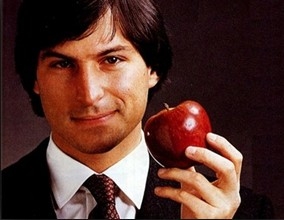Markkula’s plan envisioned ways of getting beyond the hobbyist market. “He talked about introducing the computer to regular people in regular homes, doing things like keeping track of your favorite recipes or balancing your checkbook,” Wozniak recalled. Markkula made a wild prediction: “We’re going to be a Fortune 500 company in two years,” he said. “This is the start of an industry. It happens once in a decade.” It would take Apple seven years to break into the Fortune 500, but the spirit of Markkula’s prediction turned out to be true.
馬庫拉的計劃中設(shè)想了一些方法,來開拓業(yè)佘愛好者以外的市場。“他談到了將電腦帶入尋常百姓家,推廣到普通人當(dāng)中,用來做一些諸如記錄食譜、記賬這樣的事情。”沃茲回憶說。馬庫拉作了一個大膽的預(yù)測:“兩年之后我們就會成為一家《財富》500強(qiáng)的公司。”他說,“這是一個產(chǎn)業(yè)的萌芽,十年一遇的機(jī)會。”蘋果公司最終用了7年時間才躋身《財富》500強(qiáng),但馬庫拉的預(yù)言中蘊(yùn)含的精神得到了證實。
Markkula offered to guarantee a line of credit of up to $250,000 in return for being made a one-third equity participant. Apple would incorporate, and he along with Jobs and Wozniak would each own 26% of the stock. The rest would be reserved to attract future investors. The three met in the cabana by Markkula’s swimming pool and sealed the deal. “I thought it was unlikely that Mike would ever see that $250,000 again, and I was impressed that he was willing to risk it,” Jobs recalled.
馬庫拉成為了擁有公司1/3股權(quán)的合伙人,作為回報,他主動提出為公司提供髙達(dá)25萬美元的信用貸款。蘋果成為了股份有限公司,馬庫拉、喬布斯和沃茲尼亞克三人各持26%的股份,剩下的股份保留,用以吸引未來投資者。他們?nèi)齻€在馬庫拉家游泳池邊的小屋會面,簽訂了協(xié)議。“我當(dāng)時想,邁克也許再也見不到自己那25萬美元了,我很欽佩他敢于承受這種風(fēng)險。”喬布斯回憶道。
Now it was necessary to convince Wozniak to come on board full-time. “Why can’t I keep doing this on the side and just have HP as my secure job for life?” he asked. Markkula said that wouldn’t work, and he gave Wozniak a deadline of a few days to decide. “I felt very insecure in starting a company where I would be expected to push people around and control what they did,” Wozniak recalled. “I’d decided long ago that I would never become someone authoritative.” So he went to Markkula’s cabana and announced that he was not leaving HP.
這時候有必要說服沃茲尼亞克全職加入蘋果公司了。“為什么我不能在這邊工作,同時保留惠普的職位作為我的鐵飯碗呢?”沃茲問道。馬庫拉說這樣是行不通的,他給了沃茲幾天時間作決定。“創(chuàng)辦一家公司,我覺得很不安穩(wěn),因為這就意味著我要督促周圍的人去做事,還要對他們加以控制。”沃茲回憶說,“很久之前我就決定了,我永遠(yuǎn)都不想當(dāng)發(fā)號施令的人。”于是他跑到馬庫拉的小屋,宣布自己不會離開惠普。
Markkula shrugged and said okay. But Jobs got very upset. He cajoled Wozniak; he got friends to try to convince him; he cried, yelled, and threw a couple of fits. He even went to Wozniak’s parents’ house, burst into tears, and asked Jerry for help. By this point Wozniak’s father had realized there was real money to be made by capitalizing on the Apple II, and he joined forces on Jobs’s behalf. “I started getting phone calls at work and home from my dad, my mom, my brother, and various friends,” Wozniak recalled. “Every one of them told me I’d made the wrong decision.” None of that worked. Then Allen Baum, their Buck Fry Club mate at Homestead High, called. “You really ought to go ahead and do it,” he said. He argued that if he joined Apple full-time, he would not have to go into management or give up being an engineer. “That was exactly what I needed to hear,” Wozniak later said. “I could stay at the bottom of the organization chart, as an engineer.” He called Jobs and declared that he was now ready to come on board.
馬庫拉聳了聳肩,說好吧。但喬布斯非常沮喪。他給沃茲打電話,對他好言相勸。還讓朋友幫忙去說服沃茲。他又哭又叫,大發(fā)雷霆。他甚至跑到沃茲的父母家,痛哭流涕,尋求杰里·沃茲尼亞克的幫助。這時候沃茲的父親意識到,利用AppleII真的可以狠狠賺上一筆,于是他站到了喬布斯這邊。“不管是在公司還是在家,我開始接到父母、兄弟和很多朋友打來的電話,”沃茲說,“他們每個人都跟我說,我的決定是錯誤的。”但這些沒有起到絲毫作用。接著,艾倫·鮑姆——髙中時代巴克魚苗俱樂部的好友——給他打電話了。“你真的應(yīng)該放手一搏。”艾倫說。他說如果沃茲全職加人了蘋果,并不一定非要進(jìn)入管理層,還可以繼續(xù)當(dāng)工程師。“那正是我想聽到的,”沃茲尼亞克說,“我可以待在組織架構(gòu)的最底層,當(dāng)一個普通的工程師。”他給喬布斯打電話,告訴他自己準(zhǔn)備好入伙了。
On January 3, 1977, the new corporation, the Apple Computer Co., was officially created, and it bought out the old partnership that had been formed by Jobs and Wozniak nine months earlier. Few people noticed. That month the Homebrew surveyed its members and found that, of the 181 who owned personal computers, only six owned an Apple. Jobs was convinced, however, that the Apple II would change that.
1977年1月3日,新的公司——蘋果電腦有限公司——正式成立了,它買斷了9個月前喬布斯和沃茲成立的舊公司的全部股杈。幾乎沒有人注意到這一點。那個月,家釀計算機(jī)俱樂部在會員中作了一次調(diào)查,發(fā)現(xiàn)在181名擁有個人電腦的人中,只有6個人擁有蘋果的產(chǎn)品。但是,喬布斯深信不疑,AppleII會改變這一局面。
Markkula would become a father figure to Jobs. Like Jobs’s adoptive father, he would indulge Jobs’s strong will, and like his biological father, he would end up abandoning him. “Markkula was as much a father-son relationship as Steve ever had,” said the venture capitalist Arthur Rock. He began to teach Jobs about marketing and sales. “Mike really took me under his wing,” Jobs recalled. “His values were much aligned with mine. He emphasized that you should never start a company with the goal of getting rich. Your goal should be making something you believe in and making a company that will last.”
馬庫拉對于喬布斯來說,是一個父親般的人物。他像喬布斯的養(yǎng)父一樣,遷就他的強(qiáng)烈意愿;最終卻和他的生父一樣,拋棄了他。風(fēng)險投資人亞瑟·羅克(ArthurRock)說:“馬庫拉和史蒂夫之間就是一種父子關(guān)系。”他開始向喬布斯傳授市場和銷售方面的經(jīng)驗。“邁克真的非常照顧我,”喬布斯說,“他的觀念與我也十分一致。他強(qiáng)調(diào)說,你永遠(yuǎn)不該懷著賺錢的目的去創(chuàng)辦一家公司。你的目標(biāo)應(yīng)該是做出讓你自己深信不疑的產(chǎn)品,創(chuàng)辦一家生命力很強(qiáng)的公司。”
Markkula wrote his principles in a one-page paper titled “The Apple Marketing Philosophy” that stressed three points. The first was empathy, an intimate connection with the feelings of the customer: “We will truly understand their needs better than any other company.” The second was focus: “In order to do a good job of those things that we decide to do, we must eliminate all of the unimportant opportunities.” The third and equally important principle, awkwardly named, was impute. It emphasized that people form an opinion about a company or product based on the signals that it conveys. “People DO judge a book by its cover,” he wrote. “We may have the best product, the highest quality, the most useful software etc.; if we present them in a slipshod manner, they will be perceived as slipshod; if we present them in a creative, professional manner, we will impute the desired qualities.”
馬庫拉把自己的原則寫在了一頁紙上,標(biāo)題為“蘋果營銷哲學(xué)”,其中強(qiáng)調(diào)了三點。第一點是共鳴(empathy),就是緊密結(jié)合顧客的感受。“我們要比其他任何公司都更好地理解使用者的需求。”第二點是專注(focus)。“為了做好我們決定做的事情,我們必須拒絕所有不重要的機(jī)會。”第三點也是同樣重要的一點原則,有一個讓人困惑的名字,灌輸(impute)。這涉及人們是如何根據(jù)一家公司或一個產(chǎn)品傳達(dá)的信號,來形成對它的判斷。“人們確實會以貌取物,”他寫道,“我們也許有最好的產(chǎn)品、最高的質(zhì)量、最實用的軟件等等,如果我們用一種潦草馬虎的方式來展示,顧客就會認(rèn)為我們的產(chǎn)品也是潦草馬虎的;而如果我們以創(chuàng)新的、專業(yè)的方式展示產(chǎn)品,那么優(yōu)質(zhì)的形象也就被灌輸?shù)筋櫩偷乃枷胫辛恕!?/span>
For the rest of his career, Jobs would understand the needs and desires of customers better than any other business leader, he would focus on a handful of core products, and he would care, sometimes obsessively, about marketing and image and even the details of packaging. “When you open the box of an iPhone or iPad, we want that tactile experience to set the tone for how you perceive the product,” he said. “Mike taught me that.”
在喬布斯的職業(yè)生涯中,他一直十分關(guān)注——有時甚至過度關(guān)注——營銷策略、產(chǎn)品形象乃至包裝的細(xì)節(jié)。“當(dāng)你打開iPhone或者iPad的包裝盒時,我們希望那種美妙的觸覺體驗可以為你在心中定下產(chǎn)品的基調(diào)。”他說,“這是邁克教我的。”











